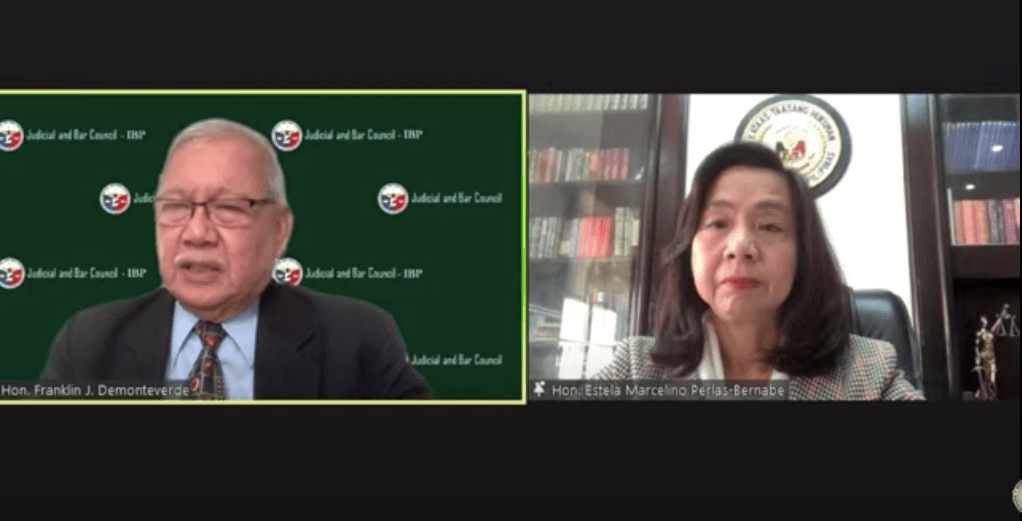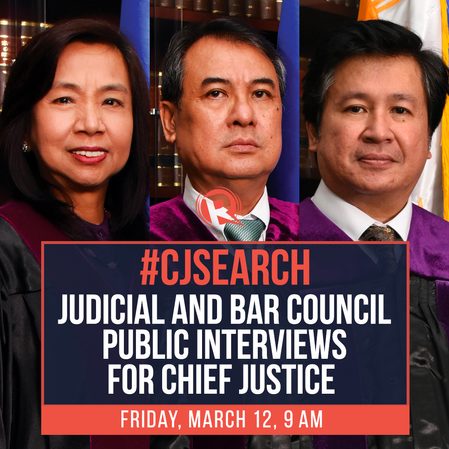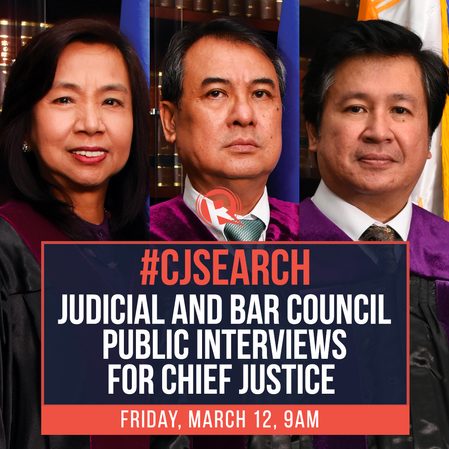SUMMARY
This is AI generated summarization, which may have errors. For context, always refer to the full article.

Senior Associate Justice Estela Perlas Bernabe said that presidential power must be within the bounds of truth and reason.
“Insofar as policy matters are concerned, there is somehow a deference to the president’s executive power, but we can also check if the exercise of this power is within the bounds of truth and reason,” said Bernabe during her Judicial and Bar Council (JBC) public interview on Friday, March 12, for the position of chief justice.
It was JBC member retired justice Noel Tijam who asked the question. Although he didn’t specify which case he was referring to, it alludes to conflict in the anti-terror law petitions and whether the executive’s expertise on national security should be respected in passing and implementing a feared law.
“When you decide policy cases where the executive branch has the responsibility of protecting national security, as chief justice, how should the Supreme Court balance the interest of the executive, expertise on national security matters, vis-a-vis the judiciary, constitutional duty to enforce the Constitution and prevent abuse of power?” was Tijam’s question.
This was Bernabe’s same question during the anti-terror law oral arguments, wherein the senior justice asked petitioners if Congress can pass a special law because national security is at stake.
Bernabe was interpellating on the house arrest provision of the law, which, for petitioners, violates the constitutional right to bail.
“Cannot Congress through law pass special limitations on a bail grant in the interest of national security and public safety, considering that what is involved here is terrorism?” she had asked.
Not unpredictable
President Rodrigo Duterte’s presidential discretion has been upheld time and again by the Supreme Court, and sometimes, on wins that Bernabe concurred in, like the cases on Mindanao martial law.
However, Bernabe’s vote on that case was nuanced, and consistent with her statement on Friday that discretion must be based on truth and reason.
Bernabe concurred in dismissing the legal challenges to Duterte’s proclamation, but disagreed that “the Court does not need to satisfy itself that the President’s decision is correct.”
“Our deference to the President must be circumscribed within the bounds of truth and reason. Otherwise, our constitutional authority to check the President’s power to impose martial law would amount to nothing but an empty and futile exercise,” said Bernabe in her separate opinion.
These kinds of nuanced votes make Bernabe peculiar as compared to the other two applicants who have fully concurred in Duterte wins.
However, she disagreed with the characterization that she is unpredictable.
“I base my decisions on the merits of each case, so if that is my judicial philosophy, basing it on the merits of the case, and applying laws and jurisprudence to the facts of the case, I would say that I am very predictable. I think the unpredictability would relate only to the cases that are political in nature,” said Bernabe.
Textualist, not so much an activist
Bernabe repeated that she is a textualist, or someone who sticks to the text of the law and the Constitution when deciding cases. Being a textualist, she has sometimes found herself dissenting with the so-called constitutionalist bloc of the Court, alongside the likes of retired senior associate justice Antonio Carpio.
“When the law is clear and the intent is clear, I interpret the law with the intent of the framers. If the intent is vague, I would apply reason, logic, and societal implications of that ruling, and fairness of that ruling,” said Bernabe, who dissented in the quo warranto ouster of former chief justice Maria Lourdes Sereno.
Asked about her views on judicial activism, Bernabe said she cannot be an activist if the text of the law is clear.
Judicial activism is a principle where the Court doesn’t back down from reviewing or even reversing actions of its co-equal branches if it finds that such actions are unconstitutional.
“I cannot be a judicial activist if the law is clear and the intent of the framers is clear because I would run contrary to the separation of powers that is going to be considered a judicial legislation,” said Bernabe.
Bernabe added: “But if the law is vague, and the intent is not clear then I can be a judicial activist, meaning, I could look at the societal implications of the ruling, the impacts on society, as well as I will exercise reason, logic, and fairness in my decisions.” – Rappler.com
Add a comment
How does this make you feel?







There are no comments yet. Add your comment to start the conversation.